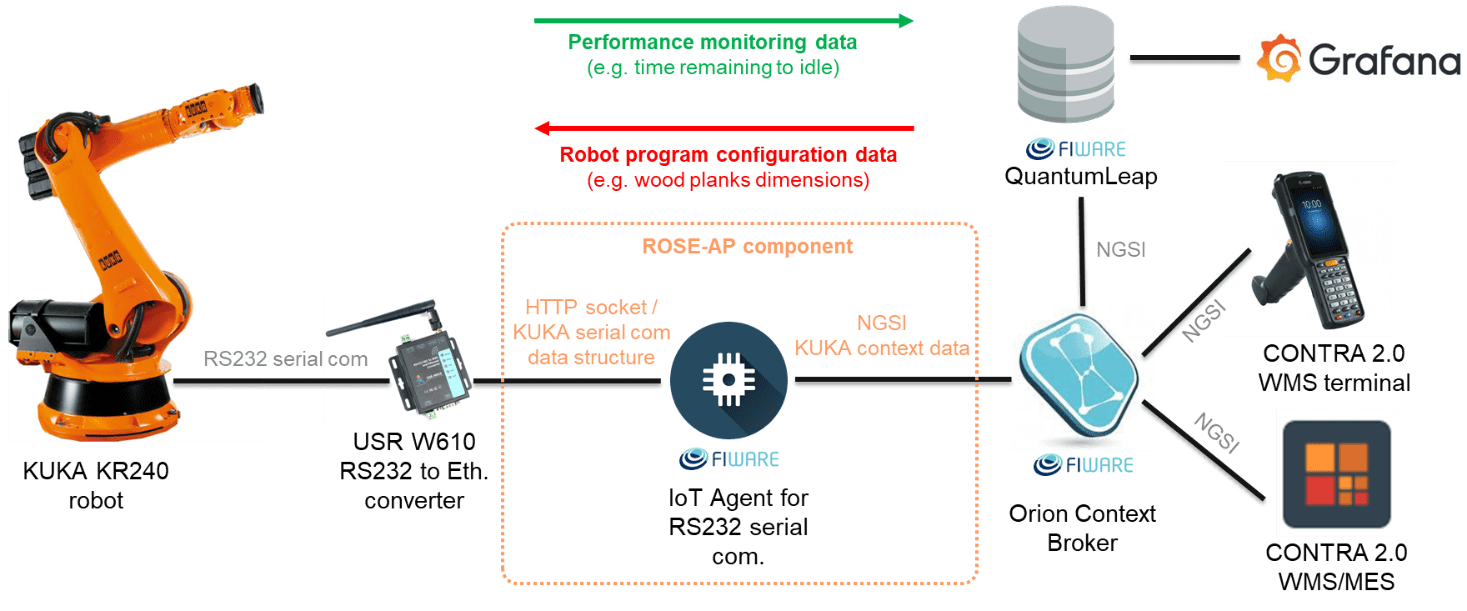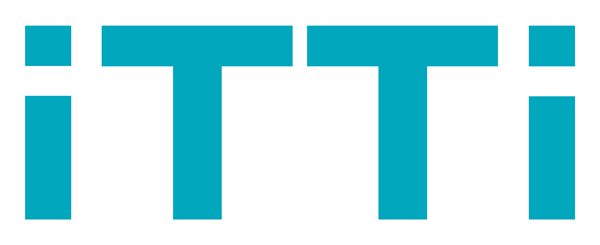Challenge & Context
A common feature of factories is usually the great diversity with regard to the age of the machines, their purpose, specificity of work and use of communication technologies. This means that within the production hall, numerous communication standards are generally not compatible with each other, and this can become a problem once a company plans to integrate its infrastructure with a Manufacturing Execution System (MES), Warehousing Management System (WMS) and/or Enterprise Resource Planning (ERP) system. The specificity of these systems requires that all their elements can freely exchange data with one another.
ACORD is a manufacturing company from the wood sector with about 100 employees. The company produces mainly wooden summer houses, while the main input resource comes in the form of planks. In recent years, ACORD has been investing extensively in the development of manufacturing automation. Following the ever-changing market situation and trying to adjust business operations to current trends along with competition, ACORD worked with ITTI Sp. z o.o, a company of ca. 100 employees who have been creating software since 1996, for the implementation of the CONTRA system. This system supports manufacturing and warehousing processes for the most typical devices such as: panel saws, thickness planers, stackers, etc. to perform production activities. Moreover, ACORD has KUKA robots which perform depalletization processes. All of the devices are human-operated and all the information related to the production processes are manually entered to the CONTRA system.
Thus, to optimize production flows — the main need of the manufacturer was to automate production lines and facilitate automatic data collection from different machines.
The idea behind the project was to integrate ACORD production devices (incl. robots) with the CONTRA system to allow automatic data collection. Such integration seems to be a cornerstone in the transformation towards Smart Manufacturing. The main problem, however, concerned the devices used (incl. robots) — most of which were older generation equipment from various manufacturers, which operate independently of each other. Also, their communication protocols differed and were not integrated with 3rd party systems, i.e. CONTRA. With this project the idea of “giving a second life to a good machine” was introduced, using the FIWARE platform and enablers it offers, to connect selected devices to the CONTRA system. Once connected to a DIH² platform, the machines and robots used by ACORD gained IoT capabilities which were crucial in facilitating real production line data. The result of the project, i.e. CONTRA 2.0, providing smart services, enabled ACORD to adjust warehouse tasks to optimise the production process and just-in-time delivery.
Solution
Essentially, the solution was to enable IoT capabilities for legacy production and warehousing machines supporting old-fashioned (but still popular) serial communication using RS232 connection and ASCII-based data protocols. The depalletization IoT Agent, designed and developed by ITTI, additionally supports MODBUS TCP protocol to retrieve data from connected machines.
The IoT agent was tested on two machines:
- KUKA KR150 robot using RS232 serial connection with additional serial-to-ethernet hardware gateway converter (USR W610),
- Automated stacker using PLC controller connected to the ACORD Ethernet, network supporting MODBUS TCP protocol.
The IoT Agent was designed to be a bridge between HTTP, ASCII-based protocols or MODBUS TCP protocol and the FIWARE NGSI standard. The solution is based in the Node.js FIWARE IoT Agent library. More information about the IoT Agents can be found within the library’s GitHub repository.
Currently, the IoT agent is customized to support warehousing and production palletization processes including:
- Depalletization — the process of removing materials from pallets or ordered pile,
- Palletization (stacking) — the process of arranging materials on pallets or in an ordered pile.
The solution developed allows access to palletization processes performance data in an automated manner. The new Smart Factory services include:
- Real-time production process monitoring — visualisation of machines’ current status, i.e. uptime, number of cycles completed, time to complete, etc;
- Early warnings for production station status (monitoring) — sending notifications to shop-floor workers when the robot’s task is near to completion so there is no idling time;
- Automatization of a machine’s configuration — e.g. regarding KUKA robots, automatic data transfer from the CONTRA system regarding input material — planks of wood dimensions, palette ID.
Real-time production process monitoring is available on the Grafana dashboard and gives ACORD the possibility to analyze both current and historical data. Completed operations or estimated production time are some examples of dashboard information that allows ACORD to control the manufacturing processes and react in case of any deviation or automation anomalies. ACORD is able to compare planned and actual production numbers at any time, which leads to more realistic predictions of the production process. Integrating KUKA robots and a stacker machine into the CONTRA 2.0 system and obtaining real and accurate data helps to calculate resource usage and optimize scheduling of incoming orders more efficiently.
Figure 1 . Example of Grafana-based depalletization dashboard for a single machine
How it works
The interoperability layer on a hardware level has been provided by a generic, commercial IoT smart communication gateway (USR-W610 RS232 Serial to WiFi Ethernet Converter) which is compatible with a machines’ hardware communication. The hardware USR-W610 gateway was connected to the machines using RS232 connectors on one side, and the local Ethernet network on the other. On a software level, the machines interoperability has been provided by the development of the custom software IoT agent (RS232-IoT-Agent) acting as a middleware between the hardware IoT gateway enabling serial to Ethernet communication conversion and the Orion Context Broker. As a result, machines supporting only legacy RS232 serial communication, which were not IoT enabled, gained new capabilities in terms of reporting and configuration data transfer. The NGSI protocol was used as an outbound interface of the RS232-IoT-Agent. In terms of DIH² platform software components, the Orion Context Broker was used to provide an infrastructure for managing production line data flow from/to the CONTRA 2.0 system and QuantumLeap GE acting as an uninterrupted context data storage for further visualization purposes using Grafana. The CONTRA 2.0 system was integrated with the FIWARE Context Broker through NGSI API to receive contextual production line data (e.g. number of executed machine programs/cycles in a given timeframe). Furthermore, CONTRA 2.0 WMS mobile application for shop-floor workers uses NGSI context query features to provide notifications for just-in-time deliveries and to configure depalletization processes directly from the mobile application (sending data from mobile terminals to the machine through the context broker and IoT Agent).
Such an approach allows easy scalability of the solution in the future — adding more machines or increasing data flow (due to scalability features of the Orion Context Broker) as well as reducing the need for extending the CONTRA 2.0 system of hardware integration functionalities and requirements for the system itself.
Figure 2 . Example of KUKA robot deployment realized during the DIH2 project
Benefits & Impact
By providing IoT capabilities for machines and new smart services, ACORD gained the following benefits:
- Reduced possibility of human errors when entering data into the system;
- More flexible task scheduling of forklift operator;
- Less idling time;
- (Near) real-time overview of connected machines’ status;
- More efficient calculation of resource usage and scheduling of incoming orders.
ACORD estimates that using automatic data transfer and warehouse application notifications will increase efficiency of production processes by around 4–5%.
Conversely, ITTI developed new functionalities for the CONTRA system, such as:
- Machine monitoring dashboards;
- Warehouse mobile app notifications for just-in-time deliveries;
- Automatic configuration data transfer from CONTRA to robot.
This makes the CONTRA system more attractive and valuable for other clients.
ITTI offers the solution to new clients, especially:
- SME manufacturing companies from Poland and Europe;
- With around 50–250 employees;
- With more than 20 machines operating in production.
CONTRA intends to target primarily the wood and metal sector, followed by plastic, packaging and cosmetics.
So far, more than 20 companies have been contacted with the offer of Contra 2.0 system, including using the IoT Agent and machine monitoring elements. Half of them are interested in such a solution in the near future. Currently, ITTI is working with one manufacturing company to implement machine monitoring using the IoT Agent, and with another company currently at the stage of defining scope of implementation.
The advantage of this solution is that it can also be offered to customers as a complex Manufacturing and Warehouse Management System. Contra 2.0, a more comprehensive and expensive solution), can be offered along with machine monitoring using the IoT Agent (as a less complex and less expensive alternative). In this way, customers can start with smaller, simpler and cheaper solutions before they start to implement the whole management system.
With new functionalities added to the Contra system during the DIH2 project, it is expected to approach further customers.
Added value through FIWARE
Using FIWARE enablers, already developed and tested, means enabling sole focus on providing new features to the CONTRA system, and to offer added value to the manufacturing company instead of developing custom infrastructural and integration components from scratch. The FIWARE ecosystem using common NGSI protocol speeds up software development greatly due to almost configuration based work. The example of such a ready-to-use feature is data visualization using a chain of the following elements: IoT Agent, Orion Context Broker, QuantumLeap and Grafana. Further potential cooperation with FIWARE enables ITTI to implement new functionalities and services. For example, possibilities of integration with other types of machines using FIWARE generic enablers is now investigated. FIWARE elements, as Open Source and free of charge make the solution more available to customers without the need of large investments. Solutions based on FIWARE elements may be attractive to both sides, customers may have less expensive solutions, implemented in a shorter time, and tech providers can focus on new, innovative features to be offered to the clients in a much faster way than developing all components from scratch.
Next Steps
As CONTRA and CONTRA 2.0 are each time tailored to the customers’ needs — new functionalities and services are constantly identified and considered to be implemented. ITTI is still investing in CONTRA system development from their own funds, but are open to and looking for opportunities for additional external financing — e.g. from research and development programmes, which could cover new, innovative elements of the proposition. Moreover, possibilities of using already existing FIWARE components are investigated.
ITTI is also looking for funding opportunities for its clients — e.g. national or EU programmes regarding digital transformation and Industry 4.0.



